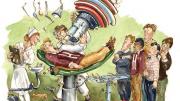1915 Professor Theodore Richards becomes the first American to receive a Nobel Prize in chemistry.
1930 All freshmen have their mouths x-rayed by clinicians from the Dental School in the wake of a general survey that indicated many students were in urgent need of dental attention.
1935 The Corporation has established a 300th Anniversary Fund to be spent not “upon physical development but entirely upon men.” The new University professorships and Harvard national scholarships are viewed as ways to increase Harvard’s service to the nation.
1940 President Conant, on nationwide radio, urges the country to give all-out aid to help the Allies defeat the Axis powers. ... A Crimson editorial calls for making democracy work at home instead of fighting Germany in Europe.
1945 The Faculty of Arts and Sciences approves a general education program for the College, requiring students to take at least two courses each in the natural and social sciences and the humanities.
1950 To counter the threat posed by Russia, President Conant, writing as a private citizen in Look magazine, urges the adoption of universal military service, of two years in duration, for all ablebodied young men.
1965 The Great Blackout of November 9 strikes in the midst of hourlies. The Bulletin’s “Undergraduate” columnist reports that those sympathetic professors who canceled exams scheduled for the next day were outnumbered roughly three to one by those who did not.
1975 To save fuel during the three-week winter break, the Faculty of Arts and Sciences will close almost all College facilities, including libraries, offices, and most of the housing system. Thermostats will be turned to 40 degrees.
1985 Women in Science at Harvard and Radcliffe (WISHR), an undergraduate and graduate organization focused on encouraging women in the fields of math and science by publicizing opportunities available to them through existing channels, gains official recognition from the University.






